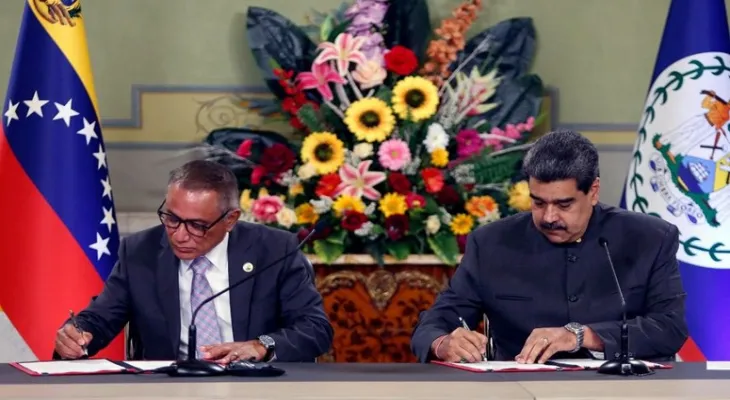Search here
Newspaper
Search here

Arab Canada News
News

Published: November 27, 2022
Breakthrough in negotiations between the Venezuelan authority and the opposition pushes Washington to ease its oil embargo
The Venezuelan authority and opposition achieved a breakthrough on Saturday in the negotiations between them in Mexico City by reaching a "broad social agreement" welcomed by the U.S. administration, which allowed the oil company "Chevron" to resume its work in the country.
This breakthrough is likely to translate into a potential easing of the strict economic and political sanctions imposed by Washington on Caracas. Such a step would have a significant impact on global oil markets and could reduce the flow of refugees from Venezuela to countries in the region.
Mexican Foreign Minister Marcelo Ebrard, who made mediation efforts between the two parties, said the agreement reached in a meeting room of a hotel in Mexico City constitutes "hope for Latin America as a whole."
The authority and the opposition agreed to take all necessary steps to release the "legitimate funds" belonging to Venezuela and "frozen in the international financial system."
These funds will feed the "Social Protection Fund for the Venezuelan People" to meet the country's most urgent needs (health system, electricity network, education, response to the recent heavy rains that claimed the lives of nearly 80 people in October).
To establish and manage this fund, both parties will seek the support of the United Nations, according to the agreement read by the representative of Norway, the mediating country in the dialogue between Venezuelans in Mexico.
The United Nations spokesperson said that Antonio Guterres "has taken note" of this request for assistance. He added, "The Secretary-General welcomes the agreement" and "encourages" the parties to conclude "new agreements addressing the political, social, and humanitarian challenges facing the country."
Venezuelan President Nicolas Maduro praised the "step towards a new chapter" for his country, which must "continue moving towards the peace and prosperity that we all want."
The chief representative of the Venezuelan authority, the President of the National Assembly, Jorge Rodriguez, said, "Through this agreement, we will save more than three billion dollars."
The opposition representative, Gerardo Blyde, announced that the fund will be managed by the United Nations with a program for the projects to be implemented.
On Saturday, the two parties of the Venezuelan crisis signed a humanitarian agreement focusing on education, health, food security, flood response, and electricity programs.
They also agreed to continue talks on the presidential elections scheduled for 2024.
The United States welcomed the agreement signed in Mexico City on Saturday between the Venezuelan authority and opposition, with a senior U.S. official considering it "an important stage in the right direction."
Later, the United States, the European Union, the United Kingdom, and Canada welcomed in a joint statement the "decision to resume dialogue" between Venezuelans, urging them to "show good faith to reach a comprehensive agreement leading to free and fair elections in 2024, the rehabilitation of democratic institutions, and ending the humanitarian crisis in Venezuela."
The European bloc and the three Anglo-Saxon countries added that they will continue "working with their international partners to meet the urgent needs of Venezuelans inside and outside their country," affirming "their readiness to review the sanctions package if significant progress is made by the regime" in Caracas.
The political crisis in Venezuela worsened after the then-outgoing President Nicolas Maduro announced his victory for a new term in the 2018 elections, which the opposition and several international parties challenged in terms of legitimacy.
Immediately after announcing the signing of the agreement in Mexico City, the U.S. Treasury Department authorized the oil group "Chevron" to partially resume exploration activities in Venezuela, which holds the largest oil reserves in the world.
The department indicated that the permit will be valid for six months, during which time U.S. President Joe Biden’s administration will assess how well Maduro’s government fulfills the commitments made in the agreement signed on Saturday.
International efforts to resolve the Venezuelan crisis have gained considerable momentum since Russia began the invasion of Ukraine, accompanied by pressures on global energy supplies.
Despite holding the largest oil reserves in the world, Venezuelans suffer from poverty and a political crisis, which has driven about seven million Venezuelans to flee the country in recent years, according to the United Nations.
The country often experiences shortages of basic goods such as food, medicine, and toilet paper.
The Venezuelan opposition demands the organization of free and fair presidential elections expected to be held in 2024. In contrast, Caracas demands the international community recognize Maduro as the legitimate president and lift sanctions, especially the U.S.-imposed oil embargo on Venezuela.
Upon his arrival in Mexico City, government negotiator Jorge Rodriguez said one of Caracas’s goals is to reach a "broad social contract" with the opposition.
"Living in Peace"
After the disputed 2018 elections, about 60 countries, including the United States, recognized opposition leader Juan Guaidó as acting president.
Rodriguez, who also chairs the National Assembly, indicated before departing Caracas that his team would defend "our right... to live in peace."
For its part, the "Unified Platform" of the opposition demanded concrete steps to resolve the "humanitarian crisis and respect human rights... particularly (providing guarantees) regarding the organization of free elections" with observers present.
However, a source familiar with the negotiations told AFP that "the opposition has not reached a consensus on the conditions required to participate in the 2024 elections."
In recent years, Guaidó’s influence has waned after losing key allies locally and regionally with the rise of leftists to the presidencies in several countries.
Colombian President Gustavo Petro became a key player in the talks since he became in August the first leftist to assume the presidency in his country.
Petro seeks to improve relations between his country and Venezuela and has resumed diplomatic relations for the first time since 2019 when President Iván Duque refused to recognize Maduro’s victory in a new presidential term.
Comments